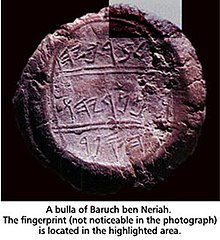Neriah
Neriah (Hebrew: נֵרִיָּה Nērīyyā, "My lamp is Jah") is the son of Mahseiah, and the father of Baruch and Seraiah ben Neriah. He is mentioned in the Book of Jeremiah (32:12 and 51:59) of the Hebrew Bible.
Talmud
The Talmud lists him and his sons as prophets.
Historicity

In 1975, a clay bulla purportedly containing Baruch's seal and name appeared on the antiquities market. Its purchaser, a prominent Israeli collector, permitted the Israeli archaeologist Nahman Avigad to publish the bulla.[1] Although its source is not definitively known, it has been identified as coming from the "burnt house" excavated by Yigal Shiloh. The bulla is now in the Israel Museum. It measures 17 by 16 mm and is stamped with an oval seal, 13 by 11 mm. The inscription, written in the ancient Hebrew alphabet, reads:[2]
| Line | Transliteration | Translation |
|---|---|---|
| 1 | lbrkyhw | [belonging] to Baruchyahu |
| 2 | bn nryhw | son of Neriyahu |
| 3 | hspr | the scribe |
In 1996, a second clay bulla emerged with an identical inscription, presumably stamped with the same seal. This bulla was also imprinted with a fingerprint;[3] Hershel Shanks, among others, speculated that the fingerprint might be that of Baruch himself.[4] The authenticity of these bullae, however, has been disputed.ibid.
Another bulla was found with the name of "Seraiahu, son of Neriyahu", believed to belong to Seraiah ben Neriah.[5]
See also
References
- ^ Avigad 114-118; Shanks, "Jerahmeel" 58-65
- ^ Avigad 118
- ^ Shanks, "Fingerprint" 36-38
- ^ Goren, Yuval. "Jerusalem Syndrome in Biblical Archaeology". Society of Biblical Literature. Archived from the original on 7 July 2007. Retrieved 26 June 2007.
- Rollston, Christopher A., Vaughn, Andrew G. "The Antiquities Market, Sensationalized Textual Data, and Modern Forgeries: Introduction to the Problem and Synopsis of the 2004 Israeli Indictment". Society of Biblical Literature. Retrieved 26 June 2007.{{cite web}}: CS1 maint: multiple names: authors list (link) - ^ Historical Evidence for Jeremiah the Prophet
